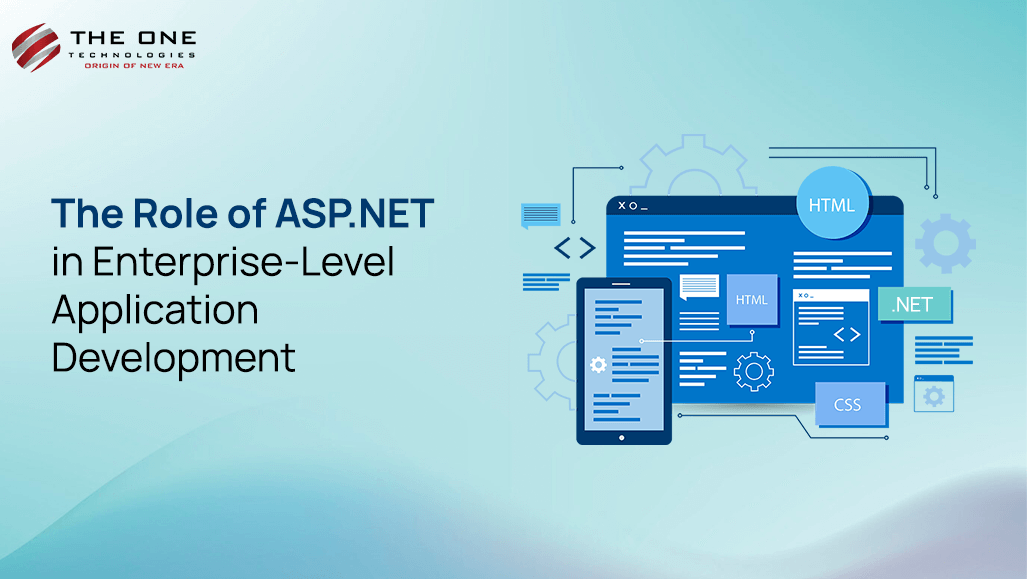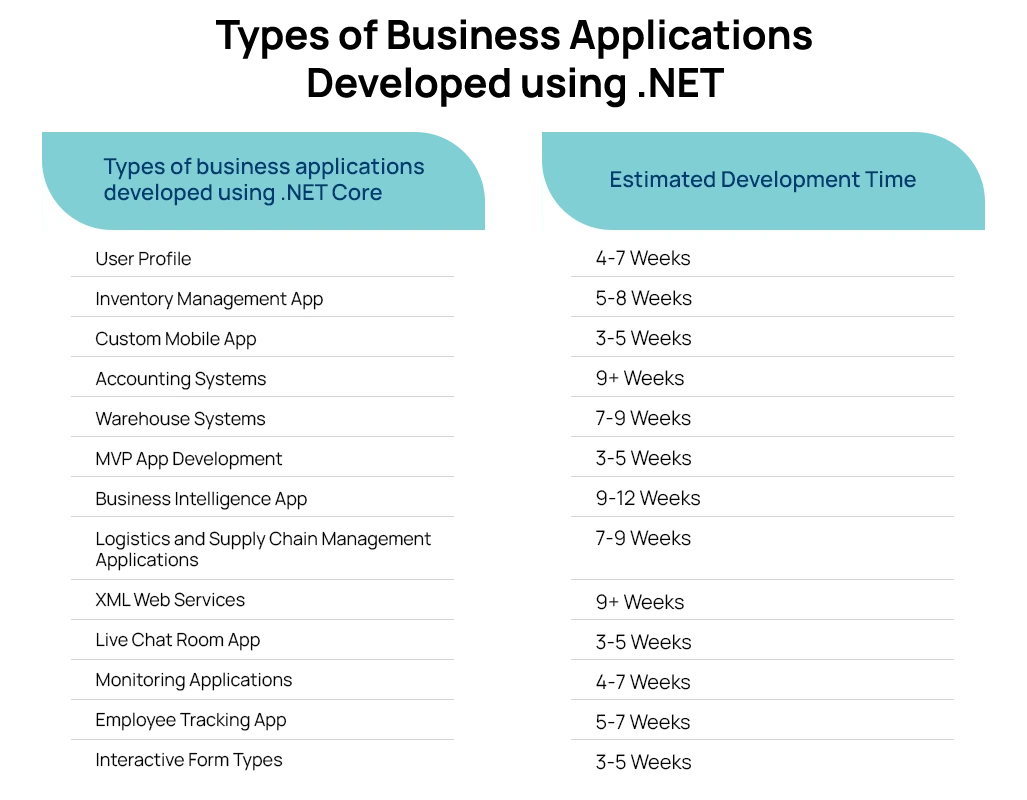The Role of ASP.NET in Enterprise-Level Application Development

The development of enterprise-level apps is at the forefront of technological innovation of modern business. These resilient, expandable, and secure solutions are the foundation of businesses, enabling them to improve productivity, streamline processes, and maintain their competitiveness. Choosing a trustworthy technology stack is crucial as companies attempt to manage the challenges of large-scale software development. Of all the options available, ASP.NET stands out as a reliable framework that is essential to the design and operation of enterprise-level applications.
This blog discusses the vital role that ASP.NET performs in the development of enterprise-level applications. We will examine how ASP.NET enables businesses to create reliable, effective, and future-ready software solutions, covering everything from its fundamental characteristics to actual case studies of successful deployments.
Table Of Content
- What is Enterprise Application Development and Why is it Necessary for Business?
- What is the Role of ASP Net in Enterprise-Level Application Development?
- Microservices Architecture
- Containerization with Docker and Kubernetes
- Serverless Computing
- Real-Time Communication with SignalR
- Advanced Caching Mechanisms
- Dependency Injection and Middleware
- Integration with Cloud Services
- Reminders and Notifications
- Machine Learning Integration
- Types of Business Applications Developed using .NET
- Final Words
- People Also Ask
What is Enterprise Application Development and Why is it Necessary for Business?
Enterprise application development is the process of developing software solutions that are specifically designed to address the demands and obstacles faced by large-scale enterprises. Enterprise apps, as opposed to off-the-shelf software, are made to handle intricate business procedures, improve workflow effectiveness, and meet the needs of a company.
_638440243065215818.webp)
Enterprise application development is crucial for several reasons in the complex procedures, large datasets, and seamless cooperation that define today's business environment. First of all, by streamlining and improving internal procedures, these apps promote higher output and lower manual error rates. They function as a centralized center for data management and processing, empowering businesses to take well-informed decisions based on insights obtained in real time.
Enterprise apps also make it easier for departments to collaborate by offering a single platform for data sharing and communication. Because of this interconnection, different parts of an organization function together more effectively, dismantling organizational storage and fostering an atmosphere that is more responsive and flexible. Furthermore, corporate apps may be adjusted and extended to meet changing needs as companies expand and change, offering a future-proof basis for continued growth.
What is the Role of ASP Net in Enterprise-Level Application Development?

Microservices Architecture
One essential component of ASP.NET's function in the creation of enterprise-level applications is microservices architecture. Developers can divide large, monolithic apps into smaller, more autonomous services by using the strong framework that ASP.NET offers, which naturally integrates with the ideas of microservices. With this method, organizations may deploy and grow individual application components with greater scalability, maintainability, and agility. Through the utilization of ASP.NET's microservices support, enterprises may adjust to evolving business needs, maximize resource allocation, and expedite development cycles, hence augmenting the ecosystem's agility and responsiveness.
Containerization with Docker and Kubernetes
ASP.NET's sophisticated role also encompasses containerization since it integrates with Kubernetes and has native support for Docker. Enterprise applications become more efficient, scalable, and portable when they are containerized. Applications built with ASP.NET may be bundled into Docker containers, offering a standardized environment throughout development and production. Further streamlining the deployment, scaling, and management of these containers is provided by Kubernetes, an orchestration platform. The combination of containerization and ASP.NET allows businesses to create and implement apps that are suited for contemporary, cloud-native settings while remaining adaptable.
Serverless Computing
By embracing serverless computing approaches, ASP.NET enables businesses to create applications without having to worry about maintaining server infrastructure. Functions as a service (FaaS), in which code is run in response to events, is the foundation of serverless architecture. Because of ASP.NET's support for serverless computing, managing resources is made easier, operational overhead is decreased, and demand-based scalability is made possible. Organizations seeking to reduce expenses, improve scalability, and concentrate on developing application logic free from the limitations of conventional server-based architectures would find these enhanced capabilities especially beneficial.
Real-Time Communication with SignalR
Real-time communication is essential for developing collaborative and interactive user experiences in enterprise-level application development. Real-time bidirectional communication between the server and clients is made possible by the SignalR package for ASP.NET. For applications that need real-time updates, notifications, or interactive components, this sophisticated capability is essential. Using chat features, live dashboards, and collaborative editing, among other features, SignalR enables businesses to create dynamic, captivating apps that live up to the expectations of contemporary consumers.
Advanced Caching Mechanisms
Enterprise-level development places a high priority on application performance optimization; ASP.NET's sophisticated caching methods help with this. These techniques, which eliminate redundant computations, improve response times, and lower database loads, include output caching and distributed caching. ASP.NET guarantees that enterprise applications provide a seamless and effective user experience, even in situations with high user concurrency and sophisticated data processing requirements, by intelligently caching data and content.
Dependency Injection and Middleware
Dependency injection and middleware are two sophisticated capabilities that ASP.NET Core includes, which improves the flexibility and maintainability of the framework. Code becomes more testable and modular when dependency injection makes managing component dependencies easier. By adding custom logic to the request-processing pipeline using middleware components, developers can create processing sequences that are specifically suited to meet the needs of their organization. These cutting-edge capabilities make it easier for developers to integrate a variety of functionalities into enterprise apps and enable them to write clear, maintainable code.
Integration with Cloud Services
Businesses are using cloud services more because of its affordability, scalability, and flexibility. Microsoft Azure is a cloud provider that ASP.NET interfaces with ease. Through this interface, businesses can take advantage of cloud computing's capabilities for analytics, computation, storage, and other areas. Businesses can achieve better resource usage, on-demand scalability, and increased dependability by implementing ASP.NET applications in the cloud, which will help them better match their applications with the ever-changing business landscape.
GraphQL Support
The advanced role of ASP.NET includes support for GraphQL, an API query language that offers a more effective and adaptable substitute for conventional REST APIs. GraphQL minimizes over- or under-fetching of data by enabling clients to request only the information they require. With the help of this sophisticated support, businesses can create APIs that perfectly meet the data demands of their applications, increasing productivity, cutting down on network overhead, and boosting overall performance in situations involving a wide range of complicated data requirements.
Machine Learning Integration
Machine learning features may now be immediately integrated into enterprise applications thanks to ASP.NET, especially with the release of ML.NET. With the help of this sophisticated functionality, enterprises may use the program itself to automate decision-making processes, generate predictions, and gain insights. Businesses may improve the intelligence of their apps and make them more predictive, flexible, and able to provide end users with tailored experiences by seamlessly incorporating machine learning models.
Types of Business Applications Developed using .NET

Final Words
When it comes to developing enterprise-level applications, ASP.NET plays a revolutionary role. ASP.NET is a solid framework that helps businesses traverse the intricacies of contemporary business. It provides an extensive feature set and an array of tools that enable developers to create applications that are safe. The framework's adaptability is demonstrated by its serverless computing models' acceptance, smooth interaction with containerization technologies like Docker and Kubernetes, and support for microservices architecture.
Enterprise apps are the backbone of organizational operations in this environment, and ASP.NET is a trusted ally, providing a foundation that is future-ready. Its cutting-edge capabilities provide creativity, flexibility, and a competitive edge in the business landscape, perfectly balancing with the dynamic demands of huge enterprises. ASP.NET continues to play a significant role in influencing how enterprise-level application development will develop going forward, giving businesses a strong platform.
If you already have a project idea in mind and want to make that vision, come true, choose The One Technologies to elevate your enterprise to new heights. As a leading mobile app development company in USA, we seamlessly integrate the power of ASP.NET into our solutions, ensuring a future-ready foundation for your organizational operations. Trust us to shape the future of enterprise-level application development and provide your business with a robust platform.
People Also Ask
What is ASP.NET's role in enterprise-level application development?
It provides a robust framework that facilitates the creation of scalable, secure, and future-ready solutions. Its versatility, support for microservices architecture, and seamless integration with modern technologies contribute to building cutting-edge applications.
How do you handle maintenance and support for ASP.NET enterprise applications post-development?
We provide comprehensive support and maintenance services for ASP.NET applications. This includes regular updates, security patches, and addressing any issues that may arise. Our team is committed to ensuring the continued reliability and performance of your enterprise applications.
Can you explain how ASP.NET contributes to a positive user experience in enterprise applications?
ASP.NET facilitates the development of responsive and user-friendly interfaces. With our expertise, we leverage ASP.NET's features to create rich, interactive user experiences. Whether it is optimizing performance or incorporating modern design principles, our goal is to enhance user satisfaction within your enterprise applications.
How do you ensure that our ASP.NET applications align with our specific business goals and processes?
Our development process begins with a thorough understanding of your business goals and processes. We work closely with your team to tailor the ASP.NET solution to your unique requirements. Our collaborative approach ensures that the final application aligns seamlessly with your business objectives.
Why should we choose ASP.NET for our enterprise-level application development needs?
ASP.NET is an excellent choice for enterprise applications due to its robust framework, scalability features, and seamless integration with Microsoft technologies. It provides a secure and reliable foundation for building large-scale, mission-critical applications, ensuring a solid and future-proof solution for your business.
Can ASP.NET applications easily integrate with our existing enterprise systems and databases?
Absolutely. ASP.NET offers seamless integration with various databases and enterprise systems. Whether you are using SQL Server, Oracle, or other databases, ASP.NET provides flexible data access options, making integration smooth and efficient for your existing infrastructure.










